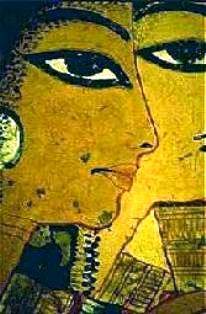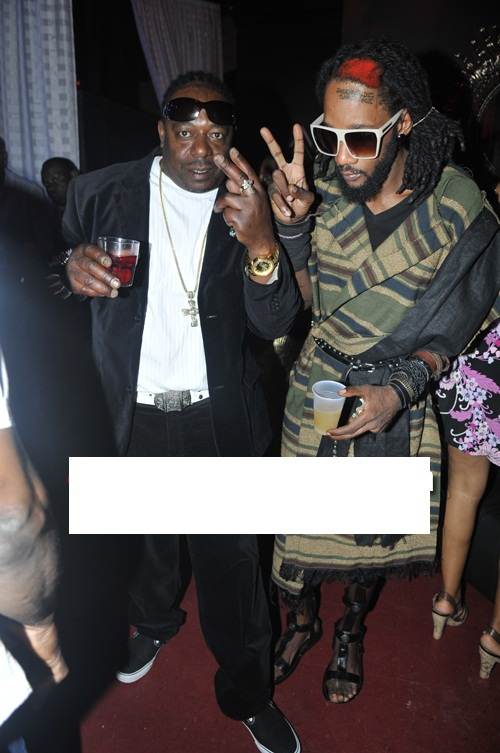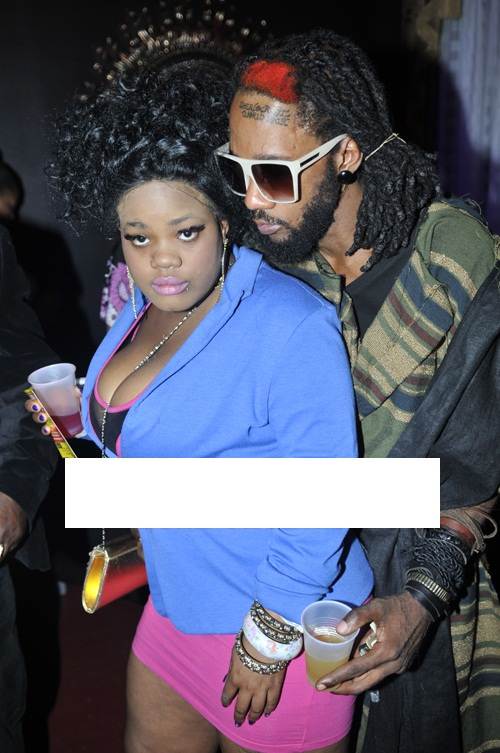WTF AFRICA- FIGHTING NIGERIAN POLICE
 Extremely excitable acts and violent encounters among uniform police officers in Nigeria are now periodic sights in the public view. These abnormal behaviors which could further give the police bad image around the nation require full psychological attention.
Extremely excitable acts and violent encounters among uniform police officers in Nigeria are now periodic sights in the public view. These abnormal behaviors which could further give the police bad image around the nation require full psychological attention.
The occasional eruption of fights between armed police officers, the exhibition of drunken behaviors and sporadic shooting by male officers mostly, in public places are sights that any reasonable citizen would hate to see.
These personality-disordered behaviors send a wrong message of indiscipline, character disorder, impulsiveness, dangerousness and madness about anyone in police service.
There is urgent need for the new management of the Nigeria police to reduce these ugly messages, horrible perceptions and unpleasant images particularly when these behaviors are not reflective of most police personnel, and these public images even in one wild or hostile officer remains all too many.
The sometime hostile police-public engagements which have sometimes resulted in outright violence by an officer against a citizen could be the hand work of a few officers and those are the ones that need to be weeded out during enlistment periods, and fully identified if they are already in the police service.
The demand on police to fight crime remains enormous and as such the stress of the work could be so exerting on some officers that they end up acting out in public between themselves with some of these responses been directed to a society that does not fully appreciate and celebrate their hard work.
Nonetheless and in spite of one’s condition, a police officer must constantly stand the test of meeting the full standards of law enforcement professional.
As such the all too common exposure to corruptible, pilfering, intoxicating, sexual abuse and other kinds of illegal/unethical/bizarre behaviors by some police officers are detrimental to the police organization and to the people; therefore these acts need full taming now.
A more control measure to fighting these problems lies with psychological testing of the soon-to-be and the already serving police officers.
The Acting Inspector General of Police, Mr. Muhammed Abubakar as part of his renovation agenda should mandate that anyone entering the police work must go through psychological screening, testing and evaluation.
With the use of psychological testing, clinical and forensic psychologists are able to fully reveal the inner side of humans in terms of intellectual, personality, and visual-motor and ethical functioning, as well as security and law enforcement tendencies.
To become a certified entrant to the police training college either as a recruit or as a senior police officer the individual must pass a series or battery of psychological tests carried out mainly by a licensed or certified Clinical and personality psychologist, and certainly not by psychiatrists as they are mainly certified in medication aspects of mental health issues.
By involving psychological tests in police work, cases of psychological imbalanced individuals are caught earlier and cutoff quickly , and for those already serving but psychologically shaky, treatment in form of therapy may be offered, and in some cases they could receive medication—this where the psychiatrist comes in mainly.
In the face of many challenges that the Nigerian police is currently fighting with it will be unusual if psychological testing does not become mandated in training matters except the current police management does not mind hearing and seeing of very disturbing police behaviors in public periodically.
The Acting Inspector General of Police, Mr. Abubakar and his management team should assist the nation in moving the police into modernity in terms of continuously professionalizing the Nigerian police.
Nigerian Govt to borrow $7.9 billion, insists country is not broke
WOMEN OF THE BIBLE SARAH-GOODMORNING
 1 Sarah and the Pharaoh of Egypt
1 Sarah and the Pharaoh of Egypt
Genesis 11:29-12:1-20
The opening verses of the story throw us in at the deep end.
Famine drives Sarah, her husband Abraham and their flocks southwards into Egypt.
In this strange land they are small fish in a big pond, uncertain of the treatment that will be meted out to them by the Egyptians – especially as Sarah is strikingly beautiful and likely to attract men’s attention.
So Abraham decides on a strategy. He will pass her off as his sister, not his wife. This way, men will be more likely to treat the group well. If they see Abraham as her husband, they may try to kill him to get Sarah.
Sarah agrees. Is she coerced into living this lie? Or is she the originator of the plan?
It is impossible to tell, since we don’t know what she feels about the matter.
Despite the later veneration of Sarah and Abraham, the Book of Genesis describes two people who are far from being saints. Later readers of the Bible gloss over the uncomfortable truths in this story.
What Abraham feared, happens. Reports of her beauty reach Pharaoh. Accustomed to the best, he has his soldiers take Sarah from her family, and pleased with her, he places her in his harem. Presumably he has sexual intercourse with her.
The reader is puzzled. Aren’t Abraham and Sarah supposed to be paragons of moral behaviour? Well, no. The hero of this story is God, not humans, and time and again he rescues people from themselves.
God has a long-range plan, and He is not going to let humans mess it up.
So Pharaoh and his country become afflicted with plagues, and when he finds out that Sarah is Abraham’s wife, he views his misfortune as punishment from the gods for his inadvertent sin of adultery. He hastily restores Sarah to Abraham, and pays compensation – even though it is clearly Abraham who is at fault. Pharaoh’s generosity contrasts sharply with Abraham’s venal behaviour. Read Genesis 11:29-12:1-20
Here’s something to do: Tell the story from the point of view of each character, one at a time. You’ll see how rich, how complex the story is.
2 Sarah, Hagar and Ishmael
Genesis 16
Sarah comes much more strongly into focus in the second part of the story. After many years in a loving marriage with Abraham, she is still childless – a terrible curse for any Jewish woman of the period, but especially for the wife of a tribal leader.
Eventually she has an idea. Speaking with great courtesy and formality to her husband, Sarah gives him her female slave, in the hope the girl with conceive a child to him. It is an ancient legal form of surrogate motherhood practised at that time – see for example Genesis 30.
A related situation is covered by the Laws of Hammurabi, in items 146 and 147:
146. If a man has married a votary* and she has given a maid to her husband, and the maid has borne children, and if afterward that maid has placed herself on an equality with her mistress because she has borne children, her mistress shall not sell her, she shall place a slave-mark upon her, and reckon her with the slave-girls.
(*a priestess who left her duties to marry; she was not supposed to have children)
147. If she has not borne children, her mistress shall sell her.
Children born in this way were counted as the offspring not only of the husband who fathered them, but of the wife who owned the slave. The slave in question was usually happy to comply, since her status if she bore a child was considerably raised, and her life became easier. She also had a large part in looking after the child, even though legally it belonged to the wife. (See Slavery for more information.)
In Sarah’s case, the plan is initially successful. The slave Hagar becomes pregnant, which is what Sarah thought she wanted.
But things go wrong. Neither woman can accept the change in Hagar’s status: Hagar is rude and disdainful to her former mistress; Sarah resents what she sees as Hagar’s new airs and graces. Dominance is the issue.
Her disappointment comes spilling out in bitter words:
‘Sarai said to Abram “May the violence done to me be on you! I gave my slave-girl to your embrace, and when she saw that she had conceived, I became contemptible in her eyes. May the Lord judge between you and me!”(16:5)
Abraham points out that the girl belongs to Sarah, not him. Sarah, in other words, has legal jurisdiction over her – as she has to a lesser extent over the free-born women of the tribe.
The problem between the two women escalates into a real conflict, and eventually reaches the point where Hagar runs away, out into the desert – even though running away, if you are a slave, is a serious crime. Despite her pregnancy, Hagar is still a servant in the household – her words, and those of the angel, make this clear. (Genesis 16:8)
Hagar heads for Egypt, and home.
But God has pity on the unfortunate girl. God sends a messenger to save her, and she returns to Sarah, gritting her teeth and accepting harsh treatment from her mistress. (See Hagar for a fuller version of her story.)
Hagar’s baby is born. It is a boy. There is great celebration. Sarah, it seems, has achieved her goal.
But things get gradually worse. Her status within the tribe is greatly diminished, and as mother to the tribal heir, Hagar flaunts her newfound power. Sarah struggles against the humiliation and pain she endures, and lets Abraham know about it in no uncertain terms.
Her complaint is in vain. Nothing changes.
As you read the story, ask yourself why this particular incident was included in the first place:
to illustrate the powers of the head wife?
or the rights to which a slave was entitled, as in the Laws of Hammurabi?
Each story has a purpose.
Then God steps in again.
Read Genesis 16
THIS WAS ALREADY CONFIRMED AS BLACK JOHN
John Doe’ aids case against Christopher ‘Dudus’ Coke
1 hour ago
Font size:
A 26-page statement filed in the Federal District Court in Manhattan has revealed that an informant only named as “John Doe’ has been cooperating with the US authorities aid in building a case against his former boss, Christopher ‘Dudus’ Coke. According to a New York Times report, ‘John Doe’ was a bodyguard and close aide to Coke’s father Jim Brown in the 1980s and over time he became a trusted senior counselor to the Shower Posse gang in Tivoli Gardens. The report states that prosecutors revealed that they had obtained the cooperation of two informants as they will present their statements before a evidentiary hearing in court today, pressing their case that Coke should be given the maximum sentence of 23 years. Coke pleaded guilty in August 2011, to charges including racketeering and conspiracy after he was captured during a month-long manhunt by the security forces in Jamaica in which more than 70 persons were left dead following an incursion in his stronghold of Tivoli Gardens. In September 2011, Coke in a handwritten letter to presiding Judge Patterson, asked for leniency in sentencing him and said he took responsibility for his actions. http://og.nr/rbt/5513-federal-prosecutors-seek-maximum-23-year-sentence-for-dudus.html
****RULES**** 1. Debates and rebuttals are allowed but disrespectful curse-outs will prompt immediate BAN 2. Children are never to be discussed in a negative way 3. Personal information eg. workplace, status, home address are never to be posted in comments. 4. All are welcome but please exercise discretion when posting your comments , do not say anything about someone you wouldnt like to be said about you. 5. Do not deliberately LIE on someone here or send in any information based on your own personal vendetta. 6. If your picture was taken from a prio site eg. fimiyaad etc and posted on JMG, you cannot request its removal. 7. If you dont like this forum, please do not whine and wear us out, do yourself the favor of closing the screen- Thanks! . To send in a story send your email to :- [email protected]




Recent Comments